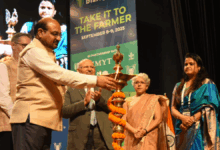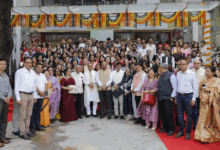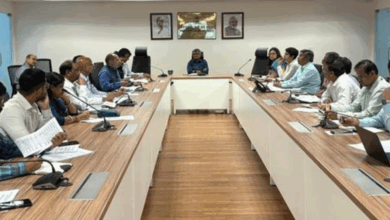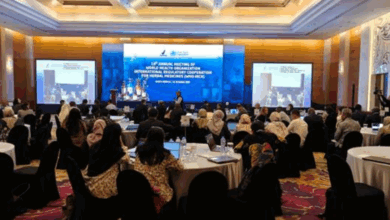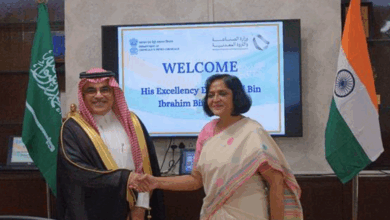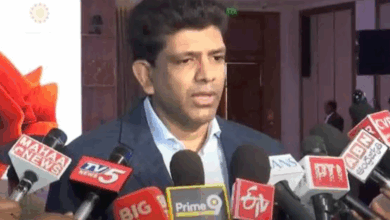Consultative Workshop on Technological Intervention and Innovations in the Honey / Beekeeping Sector
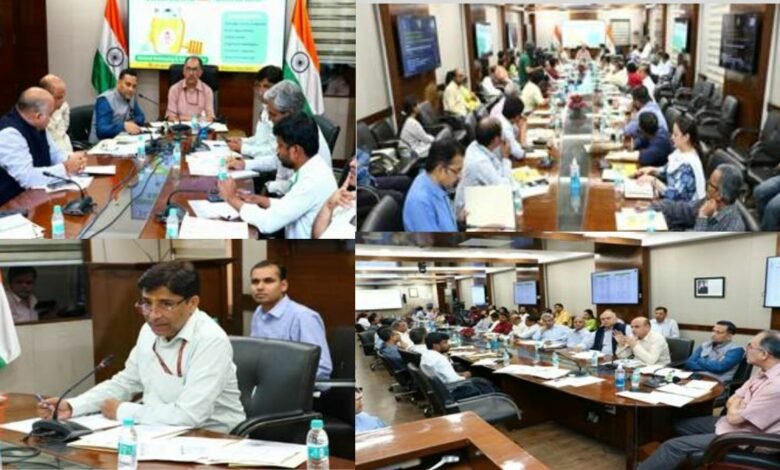
The Ministry of Agriculture and Farmers Welfare organized a Consultative Workshop on “Technological Intervention & Innovations in the Honey / Beekeeping Sector” in New Delhi yesterday under National Beekeeping & Honey Mission (NBHM). Around 600 Beekeepers honey Startups/ FPOs, stakeholders in beekeeping, officials from various Ministries/ Government Organizations/ Institutes, State Departments of Horticulture, State Agricultural Universities (SAUs)/ Central Agricultural Universities (CAUs), etc. participated in the workshop physically and virtually.
In the opening remarks of the workshop, Dr Prabhat Kumar, Horticulture Commissioner briefed about the status and scenario of beekeeping in the country. He highlighted the importance of technological interventions in beekeeping. He explained the role of the National Beekeeping & Honey Mission (NBHM) and its contribution to strengthening the beekeeping sector, including the provision of promotion of Honey FPOs and Agri startups through NBHM.
He highlighted that the implementation of the NBHM scheme is also intended to strengthen the infrastructure facilities for honey collection, storage, processing, testing & branding centres, which ultimately enhance the export potential of honey in the nation. He also stated that GI Tagging may also become a great weapon to stop adulteration and malpractices in the honey sector and encouraged the beekeepers/ stakeholders for getting GI Tagging & Geo referencing for their produce.
He invited beekeepers/ other stakeholders to avail the facilities available under NBHM and to adopt beekeeping in a scientific manner to get additional income through honey & other beehive products. He assured full support to beekeepers across the country under the NBHM scheme.
Dr N. K. Patle, Additional Commissioner Horticulture and Executive Director, National Bee Board (NBB) have given a brief presentation on the role and achievements under NBHM, GI Tagging/ Geo referencing of honey in the country, success stories of beneficiaries assisted under NBHM, opportunities for beekeepers, restart-ups/ stakeholders under NBHM, etc. Addressing the participants in the workshop, he stated that technological interventions in beekeeping are very much required. He stated that Government is committed to increasing the overall potential of the beekeeping industry in the country including supporting honey startups and FPOs in beekeeping. He mentioned that 31 Mini Testing Labs and 4 Regional labs have been sanctioned under NBHM to assure the quality of honey in the country Madhukranti Portal is another initiative under NBHM to capture the data on beekeeping through the registration of beekeepers/ other stakeholders.
He informed me that NBHM is also supporting agri- entrepreneurs/ startups for their involvement in beekeeping/ Honey production. He mentioned that the promotion & formation of FPOs is the first step for converting Krishi into Atmanirbhar Krishi and for this, he assures that the implementation of the NBHM scheme will bring revolutionary changes by strengthening the institutional framework in the beekeeping sector and for formation & promotion of Honey FPOs and Honey Startups. He also invited all beekeeping stakeholders to come forward for obtaining GI tagging of their produce.
Shri Samuel Praveen Kumar, Joint Secretary (Extension), DA&FW mentioned that for a successful mission, infrastructure, innovations and technologically sound strategies must be adopted to boost the sector. He also mentioned that the extensive outreach of the mission to reach at ground level is another key to the successful operation of the mission.
Dr Balraj Singh, Vice-Chancellor, SKN Agriculture University, Jobner, Jaipur, Rajasthan also interacted with the participants in the workshop and briefed them about the role and support from Central and State Agricultural Universities for the promotion and development of the beekeeping sector. He stated that training & skill development and Bee breeding must be encouraged to strengthen the beekeeping sector. Dr V. Geethalakshmi, Vice-Chancellor, Tamil Nadu Agricultural University, Coimbatore, Tamil Nadu, also highlighted the intervention of the university and suggested measures to boost up the sector.
Shri P. Chandra Shekara, Director General, MANAGE briefed about the potential of Agri Startups in the beekeeping sector and mentioned that MANAGE is a one-stop solution for creating successful ventures in agriculture & allied sectors. He suggested working on the literature on beekeeping and it must be available in different regional languages to make more outreach of the scheme. He suggested more capacity-building programs and setup ecosystems for startups and entrepreneurs in the beekeeping sector.
Shri Nirmal Vasrshney from Only and Surely Organic Products company, Haridwar, Uttar Pradesh also shared their experiences in beekeeping and guided beekeepers/ small entrepreneurs to expand their business and come forward to avail the assistance under NBHM. Shri Noor Mohamad Bhatt, Valley Apiaries & Food Products, Pulwama, J& K suggested providing support to old beekeepers and adulteration in honey should be restricted.
Shri Amit Dhanuka from Kejriwal Enterprises, New Delhi suggested honey pricing stability and ask for awareness about the mustard honey crystallization and restriction on antibiotics in honey adulteration of C3 & C4 and antibiotics
Shri Jayakumar, Director of Marthandam Honey FPO, Kanniyakumari, Tamil Nadu stated that GI tagging of honey will help to enhance the economic prosperity of producers of GI tag by enhancing their demand in national and international markets. He encouraged all the stakeholders involved in beekeeping to come forward for GI tagging of their produce. He also informed me that he had applied for a GI tag for Marthandam honey, which is under active consideration by respective authorities.
Shri Nimit Singh from Madhumakkhi Wala, Barabank, U.P. introduced their Honey startups and also encouraged the beekeepers/ other stakeholders to expand their profession by making honey startups and availing assistance under schemes of Govt. of India.
Dr Arjun Singh Saini, Director General (Horticulture), Govt. of Haryana, suggested an integrated way for the beekeeping sector to produce quality honey, wax-sheet manufacturing in the area, and quality honey production as the lab is approved for national facility and it will be operational in a year. He also highlighted the issues related to trust between exports and beekeepers. So, the trade centres should be required to provide a common platform. NBB should target long-term vision for this sector and focus should be given to other beehive products and bee diagnostic should be set up.
Shri Deepak Jolly, Secretary General, Indian Honey Alliance (IHA) informed that his organization will provide a unified platform to ensure maximum benefits to the beekeepers, consumers and the development of the value chain in the honey sector. Shri Pankaj Prasad Raturi, Head Bio-Resource Development, Dabur informed that Dabur is procuring honey from diverse locations in India. He also informed that Dabur has started a great initiative to provide a new stream of income and to alleviate poverty through the training and support of local NGOs in the practice of beekeeping in Bihar and Madhya Pradesh informed that Dabur has planned the same in the Sundarban forest area of West Bengal as well.
Shri Ramesh Mittal, Director, National Institute of Agricultural Marketing (NIAM), Jaipur, shared her experience of start-ups in the honey sector and gave stress to promote the honey sector. He suggested establishing Incubation Centre for Honey Sector as has been established under RKVY support. He has also extended support to NIAM for getting the GI tag in Honey Sector with dedicated efforts.
Dr Rajeev Chawala, NDDB informed us about 1st honey testing lab setup by NDDB. He has suggested various ways to address issues of testing honey. Dr Umesh, DGM, APEDA briefly described the role of APEDA in the export of honey and future strategies for its promotion. APEDA plans to create awareness among the stakeholders of food export by highlighting its impact on human life through various online platforms, including social media platforms.
In his remarks, Dr Abhilaksh Likhi, Additional Secretary, DA&FW has mentioned focusing on nurturing potential budding Agristart-ups & FPOs through support under the NBHM scheme and motivating them to choose beekeeping as an attractive career. He assures that implementation of NBHM will upgrade skills in scientific beekeeping, set up state-of-the-art infrastructural facilities for processing honey and allied beekeeping products like bee’s wax, propolis, royal jelly, bee venom, upgradation by quality control laboratories and create better supply chain by setting up of collection, storage, bottling and marketing centres. He also assures that collaborated approach of APEDA, MANAGE, NIAM, NAFED, NDDB, NBB and other related organizations will bring revolutionary achievements in the beekeeping sector.
He also stressed starting the awareness campaign through Mass Media on the uses of crystallized honey that the crystallized honey is pure/non-adulterated honey. Indigenous Species of bees need to evaluate for further region-wise popularity. He emphasized that GI tagging in honey will help to boost rural areas by increasing the revenue of the producers and employment in the region through beekeeping and honey production. The good quality of the products opens the international door for the producers thus helping to boost the exports of honey & other beehive products.
The major suggestion received from the panellist and other participants of the workshops who highlighted to work on major action points like., technological interventions on traceability of Quality Honey, setup complaint Mechanism from exporters, creating lab Infrastructure (should have adulteration and antibiotics test mechanism) along with the contact details.
Participants also suggested some revisions of assistance under the National Beekeeping & Honey Mission (NBHM). Components of NBHM like lab infrastructure to be improved, capacity building for honey beekeepers for addressing adulteration in honey, consumer outreach plan needs to be prepared and more focus should be given to bee products.
Disclaimer: This is an official press release by pib.

